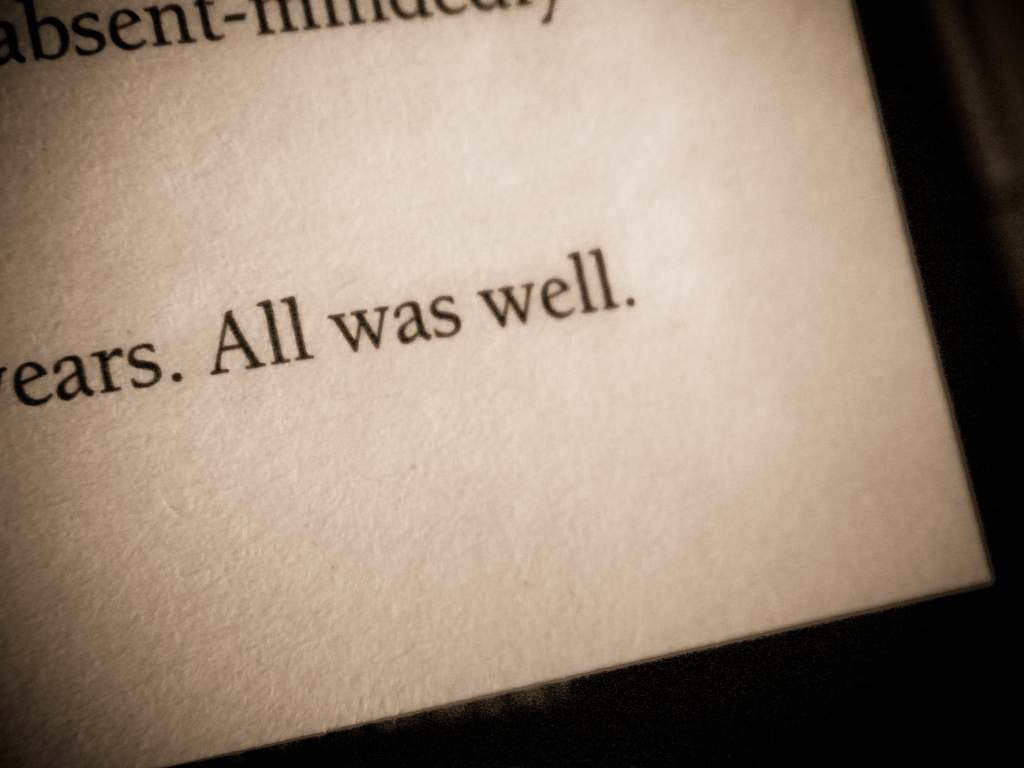The Canon Debate: In Which I Change Sides
Note: This post was written prior to my reading of Harry Potter and the Cursed Child.
*folds hands atop desk* Hello.
I come to you today to discuss an important matter – namely, the issue of canon in the Harry Potter community. This issue has been long debated, and it is my wish to enter the conversation and extend it to my peers here on the interwebs. This post comes to you as part of my Remembrall Readathon series, in light of having finished Book 6 and almost Book 7. I decided not to talk particulars about Half-Blood Prince or Deathly Hallows because time is running short, and the Cursed Child release is upon us. So instead, I shall be discussing the issue that tears at many otherwise harmonious fans: canon.
Let us first begin by defining some terms:
Canon: the material accepted as officially part of the story in an individual universe of that story (source: Wikipedia)
Headcanon: An idea or opinion about a fictional series (book, TV, comic, or otherwise) that is true in one’s head but has not become a canon fact (source: Urban Dictionary)
Fan fiction: fiction about characters or settings from an original work of fiction, created by fans of that work rather than by its creator (source: Wikipedia)
Now that that’s out of the way, let me explain why this has become an issue. Once upon a time, there was a book series called Harry Potter that was written by J.K. Rowling and contained seven books. The books were then made into eight films, which followed some of their own slightly different plots. Therefore, the Harry Potter fans separated their canon between book canon and movie canon. All was well.
Then other things started to happen. In 2007, Jo announced in an interview that Dumbledore was gay. Okay, cool. In 2011, a website called Pottermore launched, on which she published short pieces of writing about the wizarding world that revealed extra content beyond what’s included in the books: things like character backstories and info on different wand types. Cool. Years later, she became active on Twitter, randomly revealing even more as yet unknown details about the wizarding world in 140 characters or less. Now we have a play with a published script not written by Jo, three Hogwarts textbooks, a short story prequel about James and Sirius (props to anyone who remembers that), a new movie series set in America written by Jo, and many other odds and ends she has added to the Potterverse. That’s a lot of content.
So here’s the debate: One side argues that the Harry Potter canon should only be considered what is written between the covers of Books 1-7 of the Harry Potter series. The other side argues that everything J.K. Rowling writes or says (regardless of medium) is canon.
And I am so conflicted.
At MuggleNet, our directors and partners in crime, Kat Miller and Keith Hawk, disagree on this point fervently. Kat argues that all the extra material is part of the Potterverse, and is therefore canon, but Keith holds firm that the canon is exclusive to the pages of the seven books, and no more. You can read their excellent editorials here and here to see their reasoning.
Here’s my question: If the content beyond the seven books is not canon, then what is it? I disagree with Keith’s reasoning that the extra content Jo writes is fan fiction; that is taking it a bit too far. (Sorry, Keith, you’re still the best!!) She isn’t a fan; she’s the creator of the Potterverse, so what she writes is certainly not fan fiction. But if it’s not canon or fan fiction, what is it? Is it Jo’s headcanon? And if so, wouldn’t that make it just plain canon? Kat’s use of the term “extended canon” is a little closer but still implies “canon.” Maybe something like “extended content”? Whatever. Semantics.
In his article, Keith makes reference to Tolkien canon and Star Trek canon. I can’t offer any insight on Star Trek, but as far as Tolkien is concerned, I’d argue that everything he wrote within the Middle Earth Universe is canon. The problem with comparing this to Rowling, though, is that Rowling has written extended canon in more types of media than Tolkien, whose work is all traditional print sources. The Internet changes things. Does a tweet count as canon when JKR said Hagrid can’t produce a Patronus? Does the promotional material on Pottermore count? She wrote it. But it’s not in print. How does this bear on what we consider canon?
I guess it’s really up to you as a fan to make that call. From a fandom standpoint, the extra content is the lifeblood we thrive on. But from a literary standpoint, years down the line (and even in present day), when Rowling is being examined like Tolkien in lit classes, people are going to ignore all the extra stuff. What will matter are the seven Harry Potter books. My cognitive dissonance on this topic probably stems from the fact that I am both a fan and a literary/English major-y type, so I’m not sure which side to choose.
I’m conflicted because the fan part of me always wants more Potter. Anything. Everything. All the things. Potter is my favorite; give me more. There was a time when any little extra bit of info from Jo would send me into a frenzy, hair frizzling like Hermione. But not anymore…
Now, I’m getting tired of it. I’m feeling a bit exploited, a bit taken advantage of, and just plain tired. And I’m more skeptical. I think these feelings stem from fear. I fear that more and more extra info will keep chipping away at my enthusiasm and love for the originals. I fear that one day she will make some comment that Sirius was a pedophile or that Harry and Ginny get divorced or something. Now I live in uncertainty.
But what I am certain about is this: The idea that “books belong to their readers” (to quote John Green). Once a work is out there in the world, the readers get to interpret it in whatever way they will. That’s the beauty and point of literature; your Harry is different than my Harry is different than everyone’s Harry. When J.K. Rowling posts a tweet with new HP information, I feel like it’s taking away my agency as a reader to interpret the text. If in my interpretation, Hermione and Ron’s relationship is airtight and unbreakable and Rowling posts on Twitter that she thinks they’ll need marriage counseling one day, does that make my interpretation all of a sudden wrong? If we worked by this assumption, so much literary agency would be taken away from us, and that’s not how I view the point of literature.
There is an article in the New York Times that expresses my feeling on the topic quite well. Maggie Stiefvater was actually interviewed in this article, providing insight as an author and a Harry Potter fan. As an author, she doesn’t like revealing extra details about her characters beyond what’s in her books. And she doesn’t like it as a reader when other authors do it. This particular quote from her regarding Potter rang true for me:
“[P]eople aren’t remembering the series as much as the cultural phenomenon.” Of the new details that have emerged over the years, she said, “[T]hey ripple throughout fandom, and for fandom it’s highly rewarding, but as a reader it’s not how I engage with books.”
My most recent reread of the series has highlighted this point for me: With everything that has come out from the wizarding world, Harry Potter has become more about the phenomenon and less about the books. They’ve even got a logo to prove it now. It’s no longer just Harry Potter; it’s J.K. Rowling’s Wizarding World.
You could further this discussion with thoughts about money and marketing and business-y things, but that doesn’t interest me. I understand that the success of the series lends itself to everyone wanting to make as much money off of it as possible. Yes, fine, whatever, that’s how these things work. What interests me more is the implications this has for the story itself. I fear we may have reached the point where the extra stuff is detracting from the original stories. The books themselves are so rich, they are all we need. I’d be happy if we only had the books. I’m kind of starting to wish that were the case.
Because what is this darn play? Technically, Rowling didn’t actually write the words. Her name is on it because it is her story, her content, characters, plot. But the playwright is Jack Thorne. It’s starting to be a question of where do we draw the line? Our fandom is very young; we don’t have a crap-ton of extra books/video games/movies/etc. like Star Wars/Star Trek/Marvel/etc., but we will, and then what will we do? I think the key to Cursed Child is on the cover: “based on an original new story by J.K. Rowling.” If I consider everything “based on” Harry Potter canon, I’d have to include the maps of Hogwarts from the video games, the stories from the Wii Wonderbook: Book of Spells, and God forbid, the whole entire movie series. I see Cursed Child the way I see the movies – Rowling had a hand in creating something based on her stories, but it’s not an actual Harry Potter book, so to me, it’s not canon. So what is Harry Potter and the Cursed Child?? Just another text that adds to the phenomenon, but not the story.
TL;DR: I used to belong to the “everything-is-canon camp,” but I think I’m moving to the “just-the-books” camp. I want to go back to the days when we were tearing apart every sentence in speculation for the next book to arrive. When there weren’t movies or theme parks or websites or plays (though as a mega-fan, I hate admitting that). I want a return to the text. To the… and I’m saying this now… true Harry Potter canon.
You can read the original post here.




